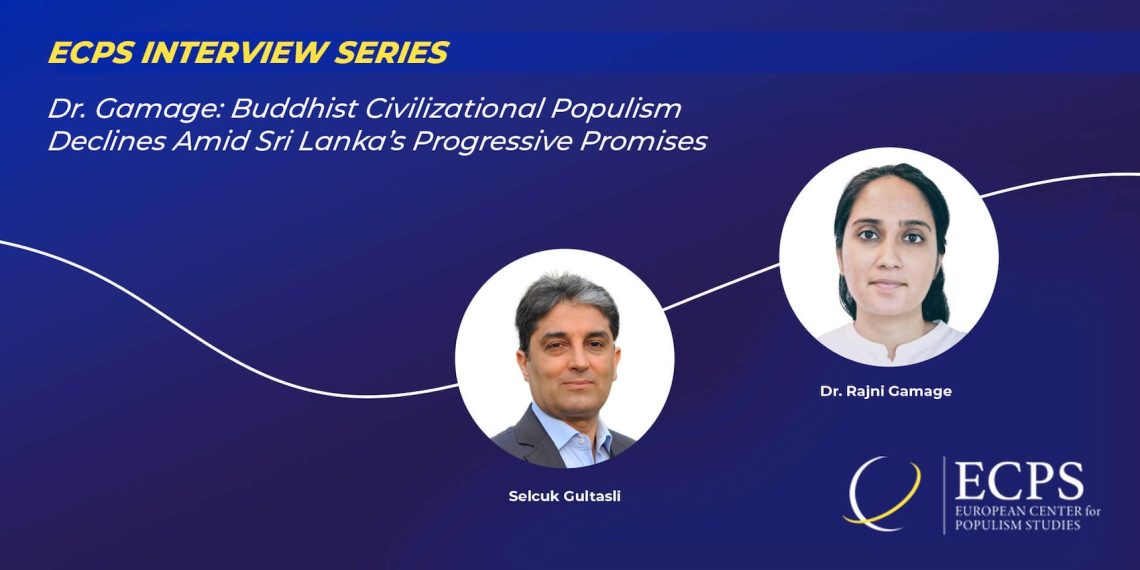Dr. Rajni Gamage highlights the decline of Buddhist civilizational populism in Sri Lanka, noting its diminished public resonance following the transformative 2022 protests. These protests, she explains, challenged both the political elite and Sinhala-Buddhist nationalism, creating a moment of reckoning. However, Gamage warns that if Anura Kumara Dissanayake’s government fails to deliver on its promises of progressive politics and economic recovery, opposition groups may exploit public discontent to revive Buddhist civilizational populism. “This phase of decline,” she says, “could shift if promises remain unmet, fueling alternative populist narratives.”
Interview by Selcuk Gultasli
In a thought-provoking interview with the European Center for Populism Studies (ECPS), Dr. Rajni Gamage, a Research Fellow at the Institute of South Asian Studies, National University of Singapore (NUS), offered an incisive analysis of Buddhist civilizational populism in Sri Lanka. She highlighted how this ideological force has shaped the country’s political and social dynamics, particularly its impact on the marginalization of minority communities.
According to Dr. Gamage, Buddhist civilizational populism, deeply intertwined with Sinhala-Buddhist nationalism, has historically emerged in waves. Currently, Sri Lanka appears to be in a receding phase, evidenced by a diminished public resonance and the reluctance of political movements to mobilize this rhetoric extensively. She attributed this decline, in part, to the transformative 2022 protests, which delegitimized both the political elite and hegemonic narratives like Sinhala-Buddhist nationalism.
Reflecting on the contemporary landscape, Dr. Gamage remarked, “The 2022 protests created a moment of reckoning, challenging not only the established political order but also the ideological frameworks that sustained it.” However, she cautioned that if the current government, led by Anura Kumara Dissanayake, fails to deliver on its promises of progressive politics and economic recovery, alternative opposition groups might capitalize on public discontent to revive Buddhist civilizational populism as a political tool.
In tracing the roots of this ideology, Dr. Gamage explored its colonial-era antecedents. She noted that early 20th-century Sinhala-Buddhist nationalism emerged as a reaction to British colonial rule, mimicking colonial logics to frame minority communities as inferior and responsible for the majority’s material impoverishment. These exclusionary tendencies, she argued, have persisted in post-independence Sri Lanka, finding renewed expression during the Rajapaksa regime.
Discussing the political trajectory of President Anura Kumara Dissanayake and the National People’s Power (NPP), Dr. Gamage underscored the transformative role of economic populism in their rise to power amidst the socio-economic fallout of the 2022 crisis. She observed, “The anti-establishment narrative of corruption and inequality was pivotal in mobilizing grassroots support.”
Dr. Gamage examined the broader implications of these populist narratives for Sri Lanka’s democratic governance. She warned that securitization efforts, such as anti-drug campaigns and moral panics, could risk undermining civil liberties while consolidating political power. The interview with Dr. Gamage not only sheds light on Sri Lanka’s evolving political dynamics but also offers critical insights into the interplay between populism, nationalism, and democracy in the context of economic and social crises.
Here is the transcription of the interview with Dr. Rajni Gamage with some edits.


